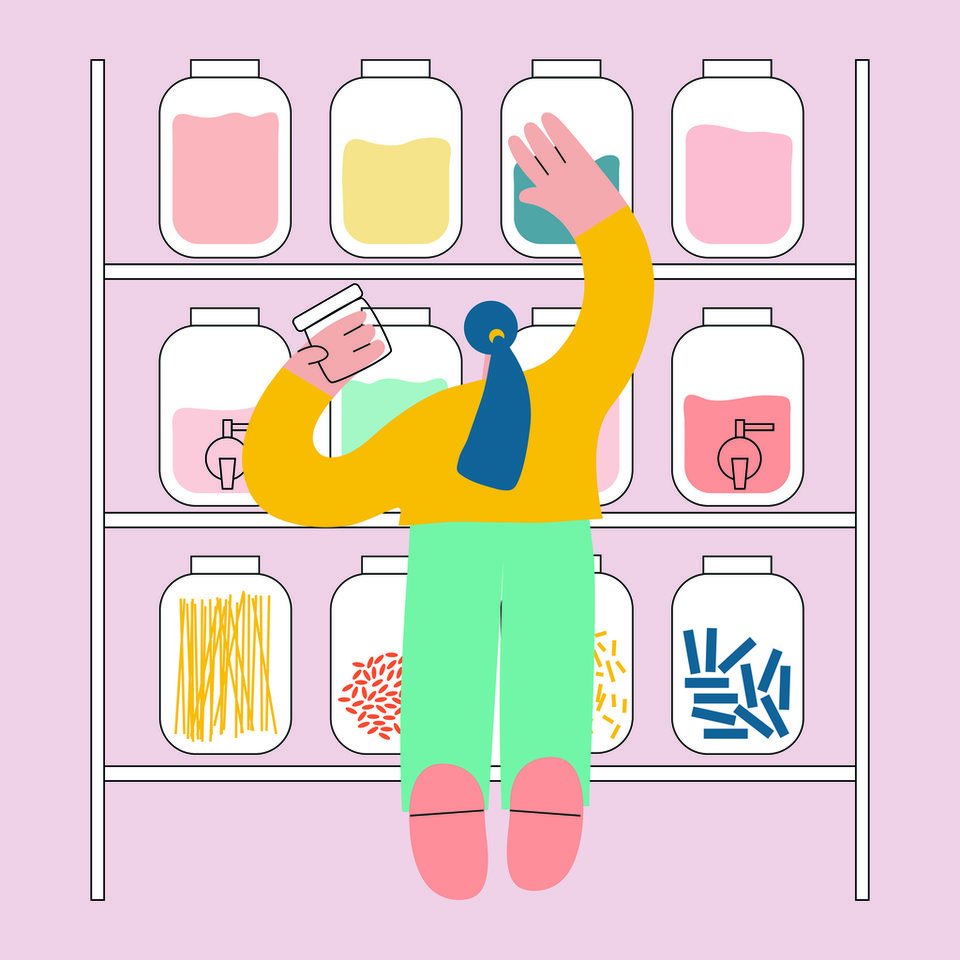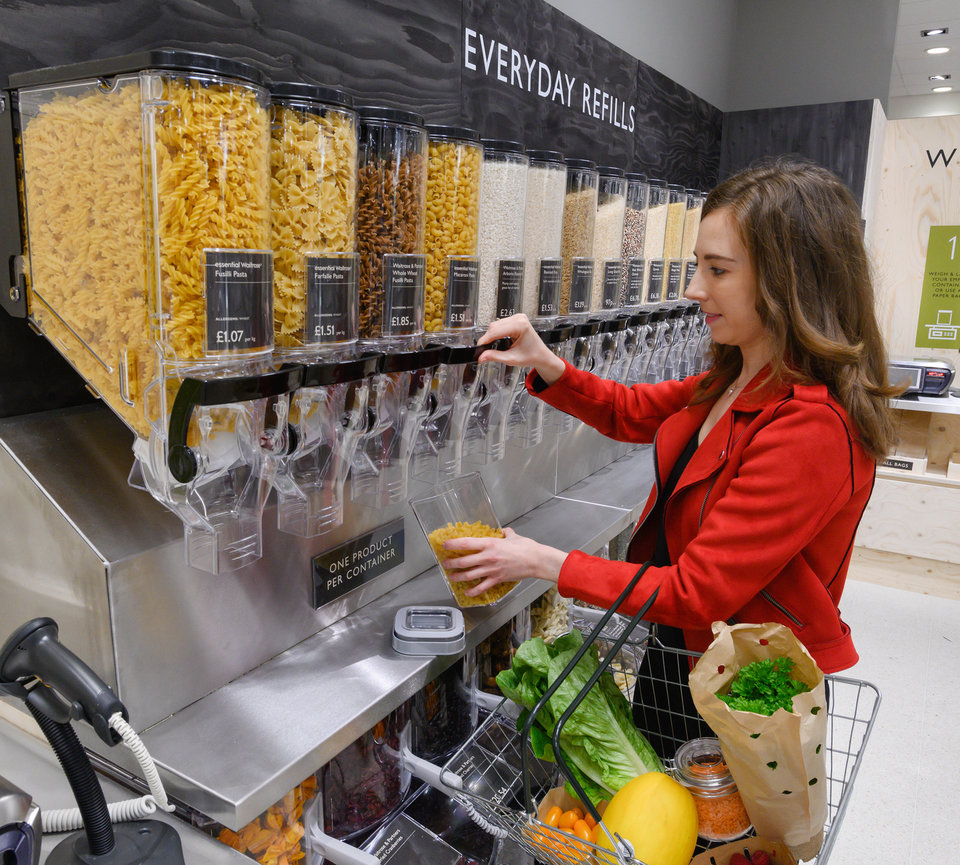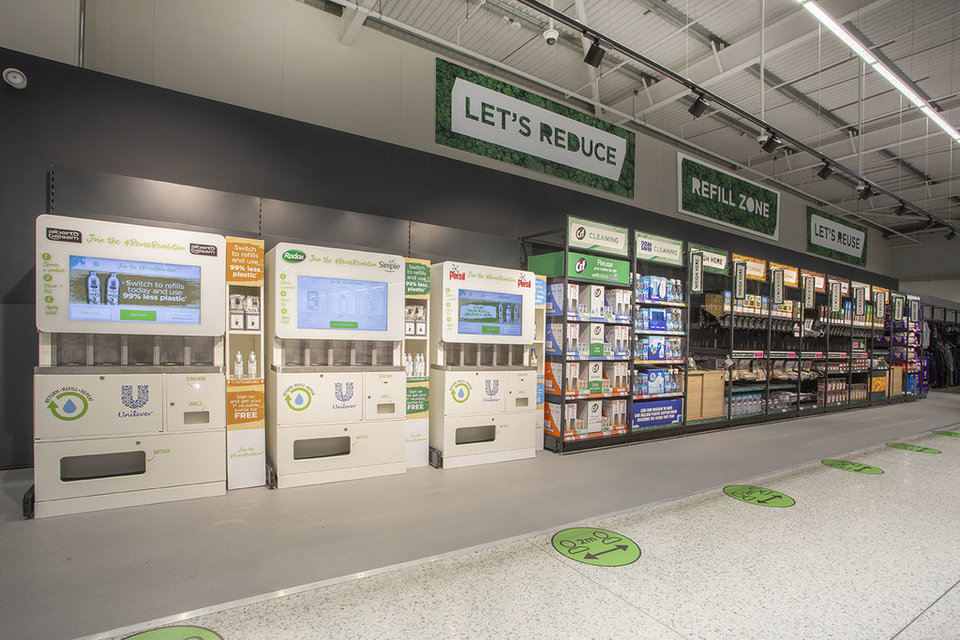sustainability
A lot to unpack: supermarkets trialling refills
Recently, UK supermarkets have been trialling packaging-free dispensers to cut plastic use. Alex Love takes a look at how successful these pilots have been, what products have been trialled, and how close we are to a nationwide roll-out.

S
upermarkets are taking action to reduce the amount of plastic packaging used. In 2019 alone, supermarkets in the UK were responsible for almost 900,000 tonnes of plastic packaging, according to Greenpeace.
Many British supermarkets have set targets to cut the amount of plastic in products. One method gaining traction is to sell loose items in dispensers. Customers can usually bring containers to fill up or use those provided, with costs typically determined after items are weighed.
Supermarkets testing dispensers cover the full spectrum of shopping, from high-end stores to budget retailers.
Waitrose, Marks & Spencers, Morrisons, Asda, and Aldi are all trialling dispensers at selected stores. Items vary between supermarkets but may include pasta, rice, cereal, tea bags, coffee, frozen fruit and vegetables, detergents, and shampoo.
But rolling out such schemes nationally is not something that can be done overnight. Each type of product has individual challenges that need resolving.
Moreover, convincing customers to move away from lifelong buying habits is also going to take time, especially as many have sought items in plastic to protect food from Covid-19 transmission – despite limited evidence of risk.
Plastic reduction
Waitrose’s Unpacked scheme began in 2019 with an initial 11 week trial at its Botley Road store in Oxford. During the trial, Waitrose reported a 98% reduction of single-use packaging for items in the Unpacked range, with an 83% decrease of all plastic packaging.
Furthermore, a report found that the vast majority of customers supported the scheme.
“A survey as part of the report found that 80% of customers said they would be very likely to shop Unpacked again and that, as the test went on, increasing numbers of customers were remembering to bring their own containers – nearly half of customers after just ten weeks,” says Waitrose spokesperson James Armstrong.
“Feedback suggested customers want to see a broader range of Unpacked products, including more brands, and that Unpacked also helped them do their bit for the environment and feel better about their purchases.”
The scheme has continued at the Botley Road store and since been rolled out to stores in Abingdon, Cheltenham, and Wallingford.

Waitrose began trialling its Unpacked scheme in 2019. Credit: Waitrose
Unpacked items were originally only available in a designated area, but since January at the Wallingford store, Unpacked items have been placed in aisles alongside packaged products, to study whether customers opt for the packaging-free items if they aren’t in a separate area. And in June, Waitrose added more items to the range.
“The products we have just launched were in response to strong customer demand, especially loose tea, frozen fruit and vegetables, and detergents. We hope to add more products later this year but are still finalising plans at this stage,” says Armstrong.
Another part of the appeal of the Unpacked range is that they are less expensive than their packaged equivalent.
“The Unpacked version will always be cheaper, but due to normal market fluctuations it may not always be consistent,” adds Armstrong.
As yet, there is no indication on whether the scheme will be launched nationwide. The retailer is working with suppliers to determine the best way forward.
“We always said that Unpacked was a test and that it would take time for us to get right. It not only means a massive shift in how people have shopped for many years is required, but it also means a significant change in the way our suppliers and growers work.
"We have got to find a way to make it commercially and operationally sustainable, as well as environmentally sustainable, if we are to roll this out," Armstrong continues.
“Fruit and vegetables is one example. While we still offer lots of loose fruit and vegetables – essential Waitrose branded broccoli, shallots, celeriac, fennel, and sweet potatoes are among those lines we have completely removed plastic from recently – we know we still have work to do.
“We are committed to delivering further reductions and are continuing to work with our suppliers and farmers to overcome some of the challenges such as when British produce is out of season.”
Trials and targets
Aldi has been trialling packaging-free dispensers for items such as pasta and rice at its store in Ulverston, Cumbria, with paper bags provided.
According to company estimates, nationwide implementation of the scheme could save as much as 130 tonnes of plastic a year.
According to an Aldi spokesperson, the company is “really pleased” with the response from customers to the packaging-free trial in its Ulverston store, adding that the retailer will be “continuing to review the feedback and insights obtained”.
The spokesperson declined to provide further information on when or if the scheme could be rolled out further, or what items may be available in dispensers in future.
However, the chain has revealed that packaging for all its own-label products is on course to either be recycled, reused, or composted by 2022. All branded items sold in its stores will meet these requirements by 2025.
Meanwhile, Morrisons has also set 2025 as the target year to reduce plastic use by 50% and has been piloting dispensers.
“Since 2019, we have trialled ambient and frozen refills in three stores – e.g. seeds, pasta, frozen fruit – where customers pay by weight for quantities put into Tupperware. To incentivise sales, our loose products have been priced at 10% cheaper than our packaged products,” says a Morrisons spokesperson.
“We are currently looking at how to bring refills to more stores, whilst thinking about how to make this shopping format Covid-19-secure.”
Roll-out
Asda has arguably gone further and faster than any other retailer with its dispenser scheme. In October 2020, the retailer opened an entire store dedicated to trialling sustainability initiatives in Middleton, Greater Manchester. Available brands include Kellogg’s cereals and PG Tips teabags.
The chain has also set a “Greener at Asda Price” promise, to ensure unpackaged items are not more expensive than the packaged equivalent.
“Middleton was a great introduction to how customers engage with refill products and we are now looking to accelerate these learnings by trialling different refill options in more stores to understand which aspects can potentially be developed further,” states Susan Thomas, Asda director of commercial sustainability.

By the end of 2021, Asda will have launched its refill scheme in five stores nationwide. Credit: Asda.
Later this year, Asda will trial the refill scheme at four more stores. In August, stores in Rugby and Glasgow Toryglen will feature dispensers. While in December, the Milton Keynes store will have nine standalone refill dispensers.
But October sees the biggest roll-out, when Asda will launch its largest refill store in York, featuring 18 refill bays. Up to 70 refillable products will be available, comprising branded and own-label items. Pet food, snacks, and baking products will be available, alongside the more regular refillable items such as dried foods.
Working with Unilever, the four stores will also feature products from Alberto Balsam, Persil, Radox, and Simple in reusable stainless-steel bottles. Shoppers can either fill bottles from an in-store machine or choose filled bottles and return them to the store when empty.
Reputation
While supermarkets are making great efforts to be greener, dispenser schemes and plastic reduction measures alone may not be enough to increase sales.
According to Patrick O'Brien, UK retail research director of GlobalData, it is more a case of green measures contributing to a supermarket's overall reputation in the eyes of the consumer.
“There is scant evidence that consumers are voting with their wallets in terms of sustainability – or indeed any other ESG [environmental, social and governance] issue – no matter what they might say in surveys about its importance," suggests O'Brien.
"But with the growth of online – and more competition generally – diluting the importance of proximity to shopper choice, brand reputation becomes more important.
“Plastic reduction announcements are just a small part in protecting those reputations, and when shoppers arrive they may not make choices in store based on packaging, or have made the decision to shop there based on any such announcement.
“But being assured that the supermarket is making an effort to be a force for good generally is an increasingly important way to nudge customers in your direction.”
However, if items in plastic-free dispensers remain cheaper than their packaged alternatives, then this will likely be a deciding factor of how widely they are embraced by consumers.